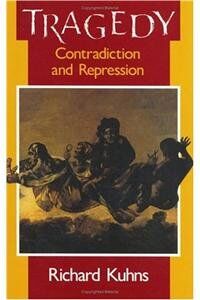Only logged in customers who have purchased this product may leave a review.
Sale!
Tragedy (Hardback) | Released: 01 Dec 1991
By: Richard Kuhns (Author) Publisher: University of Chicago Press33.00% Off Original price was: ₹ 3,277.00.₹ 2,196.00Current price is: ₹ 2,196.00.
You save ₹ 1,081.00
Drawing on philosophical and psychoanalytic methods of interpretation, Richard Kuhns explores modern transformations of an ancient poetic genre, tragedy. Recognition of the philosophical problems addressed in tragedy, and of their presence up through eighteenth- and nineteenth-century philosophical texts, novels, and poetry, establishes a continuity between classical and modern enactments. Psychoanalytic... Read More
In stock
Ships within 1-2 Business Days
100% Orginal Books
Easy Replacement
Certified product
Secure Checkout
On time delivery
Author:
Richard Kuhns
Publisher Name:
University of Chicago Press
Language:
English
Binding:
(Hardback)
About The Book
Drawing on philosophical and psychoanalytic methods of interpretation, Richard Kuhns explores modern transformations of an ancient poetic genre, tragedy. Recognition of the philosophical problems addressed in tragedy, and of their presence up through eighteenth- and nineteenth-century philosophical texts, novels, and poetry, establishes a continuity between classical and modern enactments. Psychoanalytic theory in both its original formulations and post-Freud developments provides a means to enlarge upon and inform philosophical analyses that have dominated modern discussions. From Aeschylus' classic drama The Persians to the hidden tragic themes in The Merchant of Venice, from the aesthetic writings of Kant to Kleist's narrative Michael Kohlhaas, Kuhns traces the writing and rewriting of the themes of ancient tragedy through modern texts. A culture's concept of fate, Kuhns argues, evolves along with its concepts and forms of tragedy. Examining the deep philosophical concerns of tragedy, he shows how the genre has changed from loss and mourning to contradiction and repression. He sees the fact that tragedy went underground during the optimism of the Enlightenment as a repression that continues into the American consciousness. Turning to Melville's The Confidence Man as an example of Old World despair giving way to New World nihilism, Kuhns indicates how psychoanalytic understanding of tragedy provides a method of interpretation that illuminates the continuous tradition from the ancient to the modern world. The study concludes with reflections on the poetry of Walt Whitman and Emily Dickinson. Each poet's celebration of the body, and the contribution of the senses to reason, perception, and poetic intuition, is seen as an embodiment of the modern tragic sensibility.About the Author: Richard Kuhns is professor of philosophy at Columbia University. He is the author of several books: Philosophies of Art and Beauty, published by the University of Chicago Press; Psychoanalytic Theory of Art; Structures of Experience; and a study of Aeschylus' Oresteia, The House, the City, and the Judge.


Reviews
There are no reviews yet.